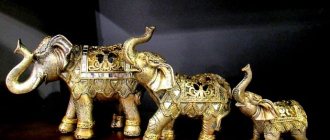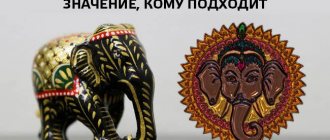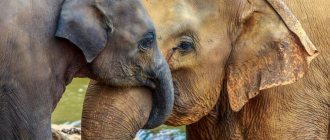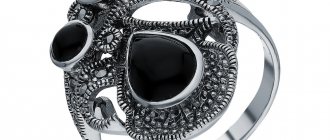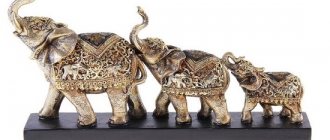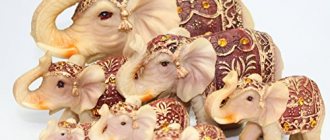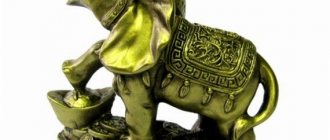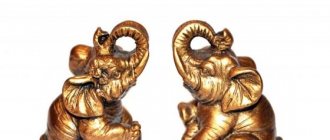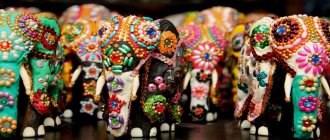The elephant represents wisdom, strength and prudence. It serves in India, China and Africa as an emblem of royal power and symbolizes the qualities necessary for a good ruler - dignity, insight, intelligence, patience, as well as loyalty, peacefulness, longevity, prosperity, happiness. In the countries of Asia and Africa, the elephant as an emblem plays the same role as the eagle or lion in the countries of Europe and America.
In Ancient India
elephant is a symbol of sacred wisdom, royal dignity, invincible power and prudence. The mighty Indra, the head of the pantheon, travels around his domain on the beautiful white elephant Airavata, which was born from the churning of the ocean. This elephant is the main one of the world's elephants, dignags, guardians of the countries of the world. Huge as mountains, with four fangs each, the Dignags support the earth on four sides.
Ganesha, the elephant-headed god of happiness, is the leader of the ganas, the lower deities who formed the retinue of Shiva, the father of Ganesha. He is called the Remover of Obstacles (Vignesvara) and is the god of wisdom and literature. According to legend, the great epic “Mahabharata” was written with the tusk of Ganesha.
In Buddhism
The elephant is the most revered sacred animal, a symbol of spiritual knowledge and stability. It is dedicated to Buddha, since a white elephant appeared to Queen Maya in a dream, announcing the birth of the royal ruler of the world, Buddha Gautama. The white elephant is a symbol of the bodhisattva, the liberator of people from the shackles of earthly existence. It is a symbol of compassion, love, kindness and prudence. He is also one of the Jewels of the Law, the mount, "vahana", of the bodhisattva. Akshobhya sits on a white elephant.
The Chinese
The elephant represents strength, prudence, insight, energy, supreme power, and also symbolizes longevity and overcoming death.
In the Greco-Roman tradition
The elephant is an attribute of Mercury, an emblem of wisdom. Pliny calls the elephant a religious animal, worshiping the Sun and the stars, purifying itself at the new moon, when, bathing in the river, it calls on Heaven. In the ideas of the ancient Romans, the elephant was associated with victory and in the visual arts it personified Glory, and also meant longevity, immortality, and victory over death.
Later, these ideas were reflected in the Christian tradition, where the elephant became a symbol of Christ’s victory over death and evil - in this case, the elephant is depicted trampling a snake.
In medieval Europe
The elephant, along with the unicorn, was classified as a mythical animal found only in fairy tales. The elephant is often found in paintings of paradise, and since the Crusades its image has appeared on coats of arms. In depth psychology, the elephant serves as the embodiment of wisdom and non-aggressive power.
Each of us has had the opportunity to see an elephant figurine at least once in our lives in interior design or in a souvenir shop. Properly placed in your apartment, elephants attract all sorts of benefits into your life. We often wonder: what do elephant figurines mean?
?
The elephant is a symbol
of harmony, longevity, the personification of spiritual knowledge and health.
Since ancient times, Asian countries have had a special relationship with the elephant. They were loved, respected, revered, and in some cases even feared. The quality of a leader was manifested in the elephant in its general physical and moral power. It is not for nothing that they were revered as a manifestation of omnipotence and reason, depicted on state signs and wished upon the rulers for all their properties: thinking abilities, rationality, tolerance, integrity, iron will, peace-lovingness. In Eastern religions and art, the elephant is a sacred animal, a symbol of indestructible strength and intelligence. Elephants
are amazing creatures. Strong and resilient, overcoming all obstacles in their path, in nature they live up to a century, thanks to restraint in food and healthy food. If an elephant loses its teeth, it dies of starvation, but not from age.
In Feng Shui, elephants are given a place of honor. They themselves, as well as their images and sculptures, are popular in teaching. Not only are bronze, wooden, glass, ceramic and other elephant figurines very attractive, they are distinguished by certain magical abilities. Ancient beliefs say that elephants help suffering women become pregnant and safely give birth to a child. But remember that, according to Feng Shui, you should never buy elephant figurines made of ivory, as they are charged with the energy of death. One day a guy came to a Feng Shui interpreter complaining about his wife’s extravagance. As a result of her careless attitude towards money, the couple was unable to save anything. The master recommended buying an elephant figurine
. My wife liked the baby elephant. She often took him in her hands, admired him and even talked to him. And gradually the stable and stable nature of the figurine influenced the woman. She became more thrifty, financial reserves began to appear in the family, scandals stopped, and harmony was restored. A pair of white ceramic elephants in the bedroom will protect the house from various negativity and keep a happy family. The trunk has a special meaning in the elephant sculpture. The raised one will bring constant material wealth and prosperity into your life, thanks to an aversion to waste and prudence in financial matters. Therefore, an elephant is an excellent gift for bosses, managers and heads of families. If the trunk is lowered, then, according to Feng Shui, this elephant is the patron of abundance, fertility and motherhood, or symbolizes longevity. The elephant will be a powerful talisman for your children. To attract well-being, it is not enough to purchase an elephant figurine; the main point is its proper location in the home. According to Feng Shui, elephants feel great everywhere. When placing the figurine in the northwestern part so that it looks out the window, in this case the elephant with its trunk will suck good luck from the star of happiness directly into the place where it stands. This means that the head of the family will acquire strong patrons. To protect against the negativity of unkind people, you need to place a couple of elephants on both sides of the front door so that they look at those who enter the house. In places where negative energy accumulates (piles of unnecessary things, the kitchen, empty corners), it is enough to place an elephant, and the atmosphere in the house will improve and will only be positive. But the most effective placement is in the southeastern sector of the house, for the elephant to represent a stable base in the financial well-being of the owners. The elephant is a very powerful talisman, which actually requires nothing to activate. You can appease him a little by hanging beads made of amber or cypress or sandalwood, or a chain of gold and silver, around his neck. The elephant will definitely like it. But in no case - made of ivory. Your patron will be angry! By purchasing an elephant statue, you have the opportunity to gain strong support and get a powerful protector!
Since ancient times, elephants have evoked reverence and respect among the inhabitants of Asia. They symbolized power and wisdom. The elephant expresses the qualities of a leader, which are demonstrated by his spiritual and physical strength.
Elephants are distinguished by endurance, as well as the ability to cope with any obstacles in their path. The emblems of many countries around the world still display these magnificent animals. Today in the article we will look at what the elephant symbolizes in ancient times.
The science of Feng Shui also notes the qualities of elephants described above, and in addition indicates that the elephant symbolizes stability, prosperity, excellent health, financial well-being and great luck.
According to Feng Shui, a special place in the elephant’s amulet is given to its trunk:
- In the case when the elephant's trunk is facing upward, it will help attract monetary profit into a person's life, and will also help to cope with unnecessary expenses and gain greater prudence in financial matters.
- When lowering the trunk down, you can talk about fertility and abundance, which the elephant will symbolize. According to another theory, such an elephant is associated with longevity.
Some feng shui experts express their opinion that elephants with their trunks down are not very auspicious as talismans. In reality, this opinion is not correct. An elephant can harm its owner only in that situation if it is positioned incorrectly in the home, and not at all because of its trunk.
In Feng Shui, elephant figurines are made from different materials: they can be wood, metal, glass, porcelain and others.
Please note that Feng Shui strictly prohibits the creation of figurines of elephants or other living creatures, the basis for which is ivory. This is due to the fact that such amulets are thoroughly saturated with the energy of death and cannot bring happiness to a person.
Even small elephants are sure to attract trust, love, harmony into your home and fill you with warmth. In addition, such figures attract positive Qi energy, necessary for a happy and successful life.
An elephant located in a prominent place in the home will protect people from unfavorable energy and contribute to solving problems and conflict situations in the family. This one is also a real generator of luck and stability.
Elephants are animals that stand firmly on their feet, so their figurines will help create a solid foundation for stability in life. It is also believed that an elephant in the form of a talisman will definitely help its owner not to make inappropriate and thoughtless expenses.
What attracts different numbers of elephants to life?
You can place one or even several elephants in your home. But what do the different numbers of these animals tell us?
- One elephant. It will make its owner more charming, and will also significantly improve self-esteem.
- Two elephants. A pair of these cute animals will attract your soulmate into your life.
- Three elephants. They will provide offspring.
- Four elephants. They act as symbols of stability and money.
- Five elephants. This amount allows you to open new businesses and also successfully fights routine.
- Six elephants. Will provide love luck.
- Seven elephants. Seven is a mystical number in many teachings, and Feng Shui is no exception. So the 7 elephants are personified with a full cup of harmony. This means that such a number of elephants will help their owner make all his dreams come true, and will also provide him with support from above.
- Eight elephants. They will help you cope with various blows of fate.
- Nine elephants. Develop intellectual abilities. It will be very good if you put 9 elephants in your baby’s room so that he becomes more successful in his studies.
- Ten elephants. This amount is a harbinger of positive changes.
- Eleven elephants. Improve your health and fill you with vitality.
Of course, it is allowed to use more elephant figures, but do not forget about a sense of proportion.
Seven elephants of luck
It is this quantity that has had magical powers since ancient times, and as a talisman it works very effectively. They will always come to the rescue in difficult times and help you fulfill your desires. What do seven elephants symbolize?
Their power is in attracting positive energy waves, acquiring the right thoughts, and a stable life without stressful situations. These figures bring good luck to your home, harmony in family relationships, help you achieve spiritual wisdom and find peace within yourself.
The legend of ancient times spoke of the great power of seven metals, which included: mercury, gold, silver, copper, lead, tin and iron. This is written in magic books and sages talk about it.
And the planets that we see, there are also 7 of them - Mars, Venus, Jupiter, Saturn, Moon, Sun, Mercury are always located at the same distance from each other and spin in the same orbit, these phenomena lead to the general harmony of our entire Universe.
The Chinese people bow to the gods of luck; oddly enough, there are also 7 of them: Daikoku, Fukurokuju, Ebisu, Bishamon, Hotei, Benzai, Jurojin.
Therefore, when seven elephants appear in your house and stand nearby, it is believed that this is a talisman that fills all family members with happiness, love, and health.
It is very important to buy these figures not gradually one at a time, but as a whole set at once.
It is in the set that they resemble each other and the sizes decrease proportionally.
If 7 elephants settle in your house, then it will always be full of happiness, love, prosperity, good luck, mutual understanding and health.
Varieties of elephants according to Feng Shui
White elephants, according to Feng Shui, are designed to protect the home from unfavorable energy and contribute to the preservation of the family.
A very popular figurine of an elephant with her baby. Their tandem symbolizes motherhood; it is recommended to place it in the home of those people who dream of offspring. Families who already have children can also take advantage of it. In this case, the amulet will protect the kids from life’s failures and ensure good relationships between generations.
Three elephants symbolize the trinity of heaven, earth and man; they will help to achieve harmony in different areas of life.
Seven of elephants. According to Feng Shui, it is a very favorable number, meaning the completion of a cycle (the duration of lunar cycles is 7 days). Thanks to this, the seven elephants will attract various benefits to your home: great luck, long life, health, love, mutual understanding, happiness, and wealth.
You can also find elephants with additional talismans, for example, the Feng Shui combination of elephant + toad is very popular. But pay attention to the fact that Feng Shui calls for harmony and does not recommend placing different talismans in the same sector, as this can lead to an imbalance in energy. The elephant acts as a self-sufficient talisman that has enormous power. And the best thing to do would be to use it yourself.
The only exception will be the activation of the amulet through various decorations (chains, beads, etc.). With their help, you will cajole your elephant so that he will perform his service even better. Why should you focus on jewelry? There is an explanation for this. Previously, when elephants were used as carriers, they were decorated with very beautiful embroidered capes, pom-poms and so on.
Symbolic meaning
The elephant is an extraordinarily intelligent animal. His wisdom is confirmed by the fact that he has no enemies in the animal world. The elephant combines enormous strength and a kind heart, and does not show aggression towards people, its own kind, or other animals. Also, as a symbol, the elephant means prosperity and good luck in all endeavors. It brings stability to the house and makes its inhabitants more tolerant of each other.
A correctly placed elephant figurine in the house activates the life energy of Qi. It is responsible for a person’s longevity, his physical and psychological health, and is able to protect household members from negative energy, acting as a barrier.
Elephant figurines create a strong foundation in relationships between household members. It is also believed that people who have a figurine of this animal at home manage their finances more competently. If you just can’t save money for a rainy day, be sure to get a figurine of a powerful animal, which should stand near the place where your savings are stored. An elephant can also make children more diligent and hardworking.
The elephant figurine is a symbol of tolerance and moderation. This value is explained by the unpretentiousness of the animal. In Buddhism, the animal is sacred.
Types of figurines
A popular figurine is an elephant with coins at its feet. This is the so-called money souvenir. Coins themselves are a symbol of wealth in the teachings of Feng Shui. Accordingly, if you add to them the energy that the elephant figurine is endowed with, you will be able to enhance the effect.
There are also figurines with animals, on the back of which there is an image of hieroglyphs, which in themselves have a symbolic meaning in the teachings of Feng Shui. Experts recommend refraining from this purchase. An overabundance of symbols often has a negative impact on energy flows. It is advisable to use all the symbols separately, except for the image of an animal with coins: they work better this way.
When choosing a figurine, you need to pay attention not to what this or that elephant figurine means according to Feng Shui, but to how much you like it. Only a beautiful talisman will work. A thing that the owner does not like will not bring positive energy to the house.
Where can an elephant stand in a house according to Feng Shui?
To find out where it is best to place a figurine in your home, you must first establish the purpose of its use:
- So if you want to win over Lady Luck, place an elephant on the windowsill. In this case, it is necessary that its trunk looks upward;
- In order to protect against negative energy and evil people, the elephant is placed next to the front door facing those entering;
- An elephant located in the south-eastern direction of the home, according to the art of Feng Shui, will be a symbol of a stable foundation in matters of finance;
- The northwestern location of the figurine will help the owner of the house or help attract a powerful patron into your life;
- A couple of elephants, if placed in your bedroom, will maintain a feeling of love and fidelity between husband and wife;
- If you want to protect yourself from enemies at work, you should use elephant figurines or place a picture of these animals next to your workplace.
Finally, I would like to note that in the process of choosing an elephant talisman according to Feng Shui, you must first of all listen to your intuition, because it will tell you which figurine is most suitable for your situation. It is also, of course, very important that the elephant arouses your sympathy, only in this case will he reciprocate your feelings.
To conclude this topic, watch this interesting video:
Each housewife decorates the interior of the family nest with beautiful figurines, vases, flowers and framed photographs. Often among the decorative elements there is a figurine of an elephant, which evokes extremely cute associations. Of course, this animal can be warlike, but first of all it is very smart, kind and easy to train. Therefore, when buying a decoration for the home in the form of this animal, we ask ourselves: “Is the elephant a symbol of what? What does it promise to the owners of the apartment who sheltered it on the shelves of the living room?
Elephant, rhinoceros and other blue accessories according to Feng Shui
Any blue figurines help in a career, make a person more purposeful, and give him confidence in himself and his abilities. But, depending on what kind of animal the figurine represents, it will have additional meaning.
Rhinoceros
For example, according to Feng Shui, the blue rhinoceros is an excellent protector. It is customary to place it in close proximity to the front door, pointing its horn at it. This helps protect the house from enemies, thieves and enemies. In the office, a rhinoceros placed according to the same principle will protect against intrigue and gossip in the team. If you work in a shared office, place the figure in front of you and slightly to the side so that the animal is looking behind you.
Elephant
The blue elephant has a similar meaning in Feng Shui. In addition to hard work and perseverance in achieving goals, it symbolizes stability, wisdom and loyalty. Often these animals are depicted in pairs. In Feng Shui, the blue rhinoceros and the elephant are the best protectors from any troubles. They will protect the house from theft, the driver from troubles on the road, and the representative of a dangerous profession from injury.
Thailand
In this country, the elephant is a sacred animal. He is revered and protected, like cows in India, cats and crocodiles in Egypt, tigers in China. The Thais worship the animal for the reason that for many centuries it has been their irreplaceable breadwinner, assistant in the household and on the battlefield. What does an elephant mean as a symbol? What is it compared to in this country?
Firstly, the beast is associated with the three levers of government in the state: the king, religion and the common people. Secondly, the beast is a symbol of power and dominance. Therefore, it was believed that the more live elephants a ruler had, the more powerful and wiser he was. The animal is often used in royal ceremonies and other ceremonial rituals.
The elephant is a symbol of what? If we talk about Thailand, then it also personifies fidelity, peace, prosperity and well-being. Residents of the country are especially kind to white animals. When a baby of this color is born here, the event is celebrated at the state level, and the king personally takes custody of the animal. The highest award is the Order of the White Elephant, encrusted with precious stones.
Other countries in Asia
Since Buddhism is practiced in Thailand, and the elephant there is one of the symbols of the religion; therefore, in other countries where this faith exists, the animal is also revered and protected by law. For example, in India. Since ancient times, the animal has been considered the personification of wisdom, dignity, nobility and invincible power. In the pantheon, he is a faithful companion of the main god, Indra, who rides around his domain on a white beast. Hindus believe: Airavat is the chief among the world's elephants, whose powerful backs support the Earth on four sides.
In a word, in all countries where Buddhism is widespread, the elephant is held in special esteem. The meaning of the symbol is interpreted in Asian powers as stability, spiritual development, prudence, love and goodness. It was in a dream that he appeared to the beautiful Maya and announced that she would soon give the world Lord Buddha. The Chinese also treat animals with respect. In the Middle Kingdom, it is associated with longevity, overcoming death, supreme power, vital energy, insight and prudence.
Europe
In the dark Middle Ages, the elephant was treated very carefully. Together with the unicorn, it was considered a mythical animal that is found only in fairy tales and legends. The beast could often be seen in paintings depicting paradise. And during the Crusades, Europeans painted it on coats of arms and shields. For ordinary warriors, an elephant is a symbol of what? Researchers believe that the animal embodied fighting spirit, power and perseverance, and therefore became a companion of the Crusaders during hostilities.
If you plunge into the depths of history, then in ancient Rome there is wisdom. In mythology, he was the partner of Mercury, the god of trade, who was famous for his excellent logic and development. The ancient Roman encyclopedist Pliny called the elephant a religious and sacred animal that worships the stars and the Sun. In the minds of the common people, he is the personification of victory, valor, longevity and immortality. In fine art, the beast embodied fearlessness and glory. When people adopted Christianity, the animal became a sign of Jesus' victory over death: in this context, the elephant was depicted as trampling a snake.
Elephant - the mascot of your home
According to Feng Shui, this animal attracts stability to the apartment. And the symbol of an elephant with a raised trunk placed on the windowsill will invite success and luck, prosperity and happiness into your home. In this case, it should be turned towards the street. If the animal looks inside the apartment, it will protect the peace of family members and their material well-being.
It is recommended to place the figurine of the beast in the southeast. It is this area of the apartment that is responsible for wealth. The accessory will also look organic in the northwestern sector: in this case, it will help the head of the family increase wealth and develop business. You ask: “In the interior, is the elephant a symbol of what?” It is usually associated with indestructible strength, determination and power.
In the house you can place both figurines of elephants and paintings with their images. Even ordinary children's plush toys are suitable: they are also used as talismans. Often people buy not just one elephant, but a set of seven animals - this figure is considered magical and multiplies the power of the amulet several times.
What types of elephants are there?
Seven elephants are chosen as gifts and home decor. There are legends around this symbol that it has the power of patience, fidelity, wisdom, and longevity.
Having such figurines in your home, you find an idyll of family relationships.
An elephant with her calves gives the joy of motherhood and a successful pregnancy. For children, this is a talisman for good luck in the educational process.
How many species of elephants are there? There are so many different versions of them in shape, size, colors, materials and even the position of the trunk that it’s impossible to count. Each of them has its own energy and symbolism.
We have selected interesting articles for you:
Yin and Yang: meaning, translation, hidden meaning, history of appearance
19.12.2021
What is the secret of God's many-armed nature?
21.12.2021
- Golden figurines develop leadership abilities, firmness and perseverance, help in achieving goals and concentration.
- The silver color of the elephant means wisdom, especially suitable for women leaders and managers.
- Crystal is a good amulet against bad people and bad influences.
- The white marble talisman helps strengthen the nervous system and deters failures and blows of fate.
- A jasper figurine enhances intuition, gives faith and additional strength.
- The malachite talisman is well suited for students and schoolchildren in obtaining an education, instills confidence and an optimistic attitude.
- The amber amulet will help increase self-esteem and get rid of jealous relationships.
This gift or purchase for yourself will bring pleasure, joy and good luck.
How to decorate a talisman?
The elephant is one of the most powerful amulets. In order for it to perform its duties to the maximum, it must be “activated”. This is not difficult to do. There is an opinion that the animal loves expensive jewelry. Remember, in Asia they are always richly decorated. Therefore, to appease your talisman, wrap it with pendants or beads. A gold or silver chain is ideal. A napkin or rug is placed under the animal’s feet.
If your house is guarded by a painting depicting an animal, then be sure to hang a rosary with semi-precious stones or an amber necklace on its right corner. It is not recommended to decorate the talisman with ivory items - this can cause a diametrically opposite result. The beast will get angry and take revenge on you for your innocently killed brothers with troubles and poverty.
What does an elephant mean as a symbol? The answer is simple: this is a good, bright and positive sign. Buy animal figurines and fill your home with them - they will not only become stylish decorative elements, but will also bring monetary profit and well-being to family members.
The ELEPHANT is, first of all, a symbol of strength. It can be either a gentle, loving force or a violent, destructive force. Elephants are considered to be vindictive because elephants never forget the insults and cruel treatment inflicted on them. The thick skin of an elephant began to symbolize spiritual invulnerability. The elephant is also a symbol of power, insight, prosperity, happiness, personifies the element of Earth, memory, wisdom, longevity, fidelity, patience, compassion. In India, China and Africa, the elephant symbolizes not just power, but royal power.
In India, the elephant is one of the three most revered sacred animals (along with the cow and monkey). According to Indian tradition, elephants carry peace. In processions, kings and queens sit on them. But the elephant is a majestic mount not only for rulers, but also for the Hindu god of thunder and rain, Indra. Ganesha, the elephant-headed god of happiness, is considered a symbol of wisdom, invulnerability and prudence in Hinduism. He is the patron of learning and the legendary author of the Mahabharata. Depicted seated and with four arms. He protects people and distributes gifts among them.
The elephant in India symbolizes not only the qualities necessary for a good ruler (dignity, intelligence, prudence), but also peace, abundant harvests and fruitful showers, that is, everything good and positive that makes up the life of Hindus.
In Thailand, Cambodia and Burma, the white elephant became a similar symbol of fertility and rainfall.
Among Indian Buddhists, the white elephant is considered a more sacred animal than even the cow. Because it is into it, Buddhists believe, that after leaving the mortal coil, the souls of priests and heroes, kings and saints move.
There are many stories associated with the white elephant. Thus, Queen Maya in Nepal had a dream that a white elephant from the Golden Mountain entered her. This elephant had six tusks. Royal astrologers predicted that the queen would give birth to a boy who would become the savior of the human race. Since then
Symbol of the Republican Party in the USA
The white elephant is sacred in Buddhism and represents the patience, experience and wisdom of the Buddha.
In order to understand the symbolism of this dream, we must remember that in India the color white means humility; the number six is considered sacred; the tusks were arranged according to the six Hindu dimensions of space (up, down, back, forward, left, right).
The whiteness of the elephant personifies purity and virtue, which means that not every soul will be accepted by the elephant. Only powerful monarchs could own a white elephant. And with all their titles, they considered the title “owner of the white elephant” to be one of the most important.
To get it, the kings declared war on each other or attacked without warning and fought bloody battles.
For the Chinese, the elephant symbolizes cosmic energy, strength, and prudence.
For Buddhists, the elephant is a symbol of spiritual knowledge and stability.
In Ancient Rome, the elephant was an attribute of the god Mercury, a symbol of his wisdom. In the ideas of the ancient Romans, the elephant was associated with victory (in the visual arts it personified Glory). When Alexander the Great (356-323 BC) tried to conquer India, he mounted his soldiers on elephants, building what looked like small fortresses on the animals' backs. This was later reflected in the Christian tradition, in which the elephant became a symbol of Christ’s victory over death and evil - in this case, the elephant is depicted trampling a snake.
Medieval beliefs that the elephant abstained from sexual intercourse during the long period of its mate's pregnancy made it a symbol of chastity, devotion and love in Europe.
The huge mass and clumsiness of the elephant have now become metaphorical, but there is a wonderful Hindu legend that elephants once flew, but lost this gift after they were cursed by a hermit, whose home, built in the trunk of a banyan tree, they accidentally destroyed when landing.
The image of an elephant is widespread on good luck amulets.
The image of an elephant carrying earth is preserved in heraldry.
The elephant is the official symbol of the Republican Party in the United States. He first appeared in this capacity in 1874 in a cartoon by Thomas Nast, which depicted an elephant trying to trample inflation and chaos.

